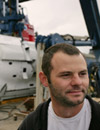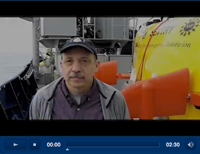 Erik Cordes: One of the least explored places on Earth is in the deep sea. Erik Cordes is a community ecologist working on the interactions between species and how they form communities in the deep sea. Read the interview »
Erik Cordes: One of the least explored places on Earth is in the deep sea. Erik Cordes is a community ecologist working on the interactions between species and how they form communities in the deep sea. Read the interview »
|
  Today's Weather Sunny Lat: 28° 40' Long: -88° 25' Air temp: 43°F (6°C) Water temp: 73°F ( 22.8°C) Barometric pressure: 1010 mbar Seas: 4-6 feet Wind: WNW, 24 mph
Once More into the DeepDecember 13, 2010 (posted December 14, 2010) Chuck Fisher, the cruise’s chief scientist, decided to ask the National Science Foundation to extend our time here for one more day to help answer questions that are important right now. What happened to the oil? How might it affect the deep-sea ecosystem? Is it having an impact on certain animals and not others? We hope today’s dive in Alvin will give us a more complete set of samples and data describing conditions on the seafloor near the Deepwater Horizon well. Waiting for the next opportunity to bring Alvin or another deep-submergence vehicle down to the Gulf to do these things could not happen soon enough. It comes down to the fact that we are here and we have the right equipment and the right people, so we should do everything we can to get the job done well. If the weather permits, today will be Alvin’s final dive before it returns to Woods Hole, Mass., for a complete overhaul and upgrade. In a little more than a year, the sub’s familiar red sail should be back in the water and on the ocean floor, but it will be a very different submersible, and it will be on its way to being even more versatile. The yearlong pause in operations by one of the world’s best-known and hardest-working subs gives us an opportunity to ask an important question: Why do it? Why go through all the trouble and the risk of sending people to the bottom of the ocean when we have vehicles that can do many of the things, and sometimes even more things, than humans in Alvin can? That is not a trivial question because it costs a lot to operate Alvin, and this overhaul signals a commitment to continue operating the sub for many years to come. The key is that Alvin allows us to take our most important environmental sensor to a place that no other vehicle can—us. “No technology can recreate experience of being somewhere,” said Chris German, chief scientist for the National Deep Submergence Facility and a co-principal investigator on this cruise. “Even the smartest engineers haven’t been able to recreate the experience of seeing something for yourself. It’s not surprising that the scientists who go down in Alvin say it’s a completely different experience than looking at photographs or viewing things on even the largest flat screen.” That’s not to say that Alvin is superior to all other types of vehicles. They Having both Sentry and Alvin in the water doing what each does best, and combining that with information brought back by the remotely operated vehicle Jason in November, made this trip unique. It was also perhaps a glimpse into the future of deep-sea exploration, one in which data from all of these different types of vehicles merge seamlessly to create a broad picture of what is going on deep beneath the ocean. Half of our planet is more than two miles under water and can only be accessed with deep-submergence vehicles. As remote as it is, it’s not an isolated place. "What happens on the seafloor eventually reaches up to us on land," Fisher said. Tonight and tomorrow we sail back into Gulfport, Miss. Because of our additional dive day, the crew and science party only have a few hours to pack and clean out the ship before it departs for Jacksonville, Fla., and a three-month maintenance period. That’s a very quick turnaround and, in addition to giving up a day on shore before the trip, the crew is giving up a day on shore at the end now, too.
Read the new Interview  Erik Cordes: One of the least explored places on Earth is in the deep sea. Erik Cordes is a community ecologist working on the interactions between species and how they form communities in the deep sea. Read the interview » Erik Cordes: One of the least explored places on Earth is in the deep sea. Erik Cordes is a community ecologist working on the interactions between species and how they form communities in the deep sea. Read the interview »
[ Previous update ] [ Next update ]
|
||
Mailing List | Feedback | Glossary | For Teachers | About Us | Contact
© 2010 Dive and Discover™. Dive and Discover™ is a registered trademark of Woods
Hole Oceanographic Institution


